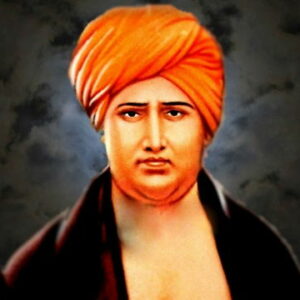In 1876, Dayanand Saraswati, a prominent Hindu religious leader, and Vedic scholar, was the first Indian to demand India’s independence from British domination. Extremely clever and reasonable, he was decades ahead of his time. He was a fervent follower of the Vedic tradition and condemned the widespread idol worship and ceremonies of his period. As a master of Vedic lore and Sanskrit, he endeavored to wean Indians away from pointless rituals and steer them towards authentic Vedic philosophies. Even as a young lad, he was inclined toward asceticism, and when his parents attempted to arrange his marriage with a woman of their choosing, he ran away. He translated the Vedas from Vedic Sanskrit into Sanskrit and Hindi so that the average person could also read them. As a visionary, he advocated for the equality of human rights regardless of gender, religion, or social background. Among his greatest achievements to humanity was the establishment of the Arya Samaj, a socio-cultural movement that promoted authentic Vedic education and advocated for social upliftment.
Youth and Early Life
Mool Shankar was born in Gujarat, India, to Karshanji Tiwari and Yashodabai, his parents. Caste-wise, his family was Brahmin. His father was a wealthy and influential tax collector.
His upbringing was comfortable because his family was financially secure. His father was a devout devotee of Lord Shiva, and he required his children to worship the god and observe fasts. As a child, he was instructed in the Vedas and Sanskrit.
The loss of his younger sister was one of the early occurrences that prompted him to contemplate the meaning of life. Concerned by the concerns their kid had begun to ask, his parents attempted to marry him off.
Young Mool Shankar determined that family life was not for him and fled his home.
His Later Life
As an ascetic searching for answers to his doubts about life and death, he wandered the earth after the death of his younger sister. From 1845 through 1869, he traveled throughout India in search of “the truth.” He traveled to temples, met numerous yogis, and even stayed in Himalayan retreats. But no one could provide him with the answers he sought.
One day, when he arrived in Mathura, he found what he had been seeking. There, he met Swami Virajanand Dandeesha, whose disciple he became. The young guy was advised by Virajanand to discard all of his books and instead seek knowledge directly from the Vedas.
He completed his Vedic study under the tutelage of his teacher, who also instructed him to disseminate Vedic knowledge among the populace, as the common man was straying from the actual understanding of the Vedas and becoming mired in useless rituals.
When it was time for Mool Shankar to depart the ashram, Swami Virajanand rechristened him as Rishi Dayanand. Dayanand vowed to his instructor and mentor that he would devote his life to spreading the Vedic teachings.
In April 1875, as promised to his Guru ji, Dayanand founded the Arya Samaj in Bombay. It was a socio-cultural movement with the motto “Make this world noble” (Krinvanto Vishvam Aryam) that intended to improve society by educating the populace about authentic Vedic knowledge.
The Arya Samaj was founded on 10 principles derived from the Vedas but separate from the predominant Hindu practices of the time. Dayanand did not wish to start a new religion; rather, he desired to reinstate the ancient Vedas’ teachings.
The 1875 publication ‘Satyarth Prakash’, which translates as ‘The Light of Truth,’ is regarded as one of his most important scholastic works. This book focuses mostly on the reformist measures he espoused and a comparative analysis of the many religions in India.
Instead of mindlessly following a religion, he wished for individuals to think independently and evaluate its teachings. He strove to elevate society via spiritual and social reforms.
His Major Opera
He established the Arya Samaj, an organization for teaching the authentic Vedic religion and a social reform movement. He battled for equal rights for all and advocated for the social advancement of women and the so-called lower caste. He criticized beliefs and customs like animal sacrifices.
Personal History and Legacy
Dayanand was fascinated by asceticism from an early age and wandered away from home as a teenager in quest of the truth.
He was a very outspoken individual who courageously fought against society’s ill activities and criticized pointless religious practices. Due to this, numerous individuals turned against him and attempted to murder him.
On September 29, 1883, he was given a glass of poisoned milk by his own cook, who had been bribed to kill him. The swami endured a whole month of agony before departing for heaven on October 30, 1883.
Estimated Net Worth
Swami Dayananda Saraswati’s estimated net worth is $3 million and his primary source of income is as a priest, autobiographer, and philosopher. We lack sufficient evidence regarding Swami Dayananda Saraswati’s automobiles and lifestyle.
Trivia
On his deathbed, this Hindu spiritual leader forgave the guy who poisoned him.


